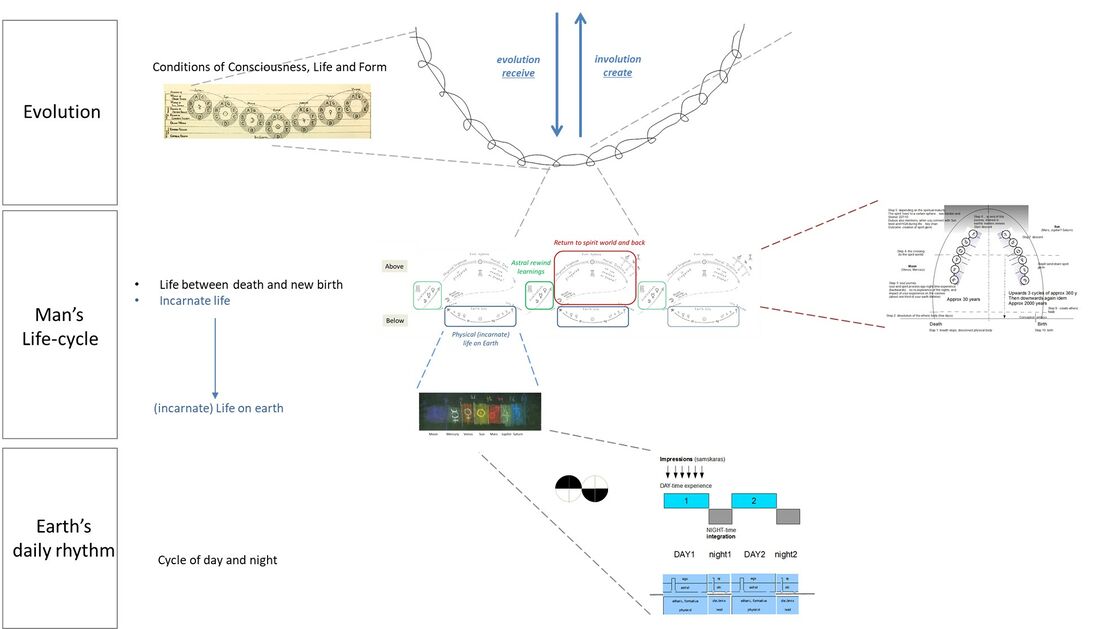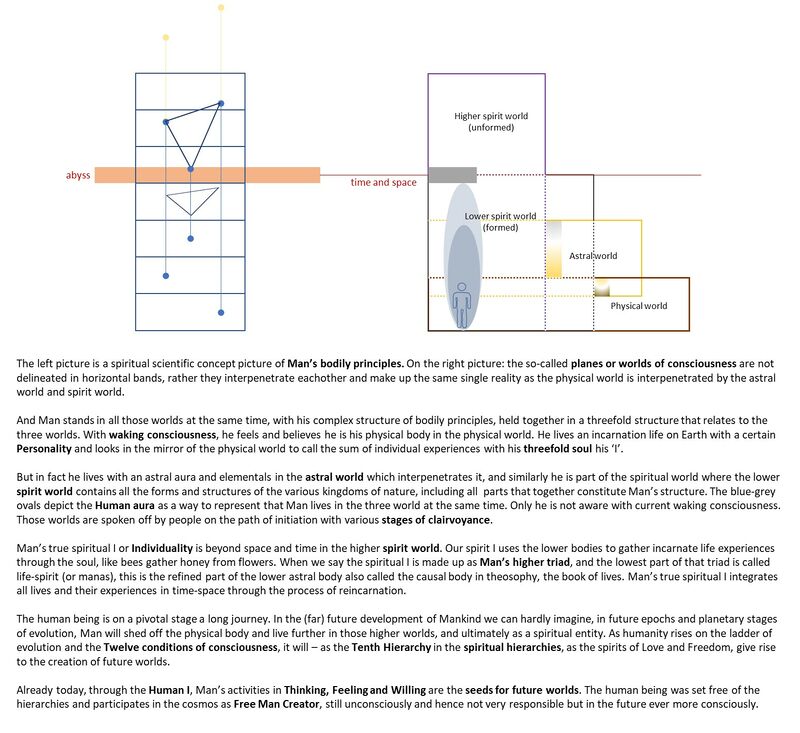Man and the macrocosmos
This is a temporary placeholder - page to be developed
As a temporary introduction ..
- please see the topic page Introduction to Man as microcosmos
- and read Introduction to Man as microcosmos#Overview coverage
Aspects
Inspirational quotes
Pythagoras
Know thyself and you will know the universe and the gods.
Paracelsus
Man is a microcosm of the macrocosm.
Plotinus
To know oneself is to know the divine.
The ability to think of the Universe as an organism depends on our learning to understand the hieroglyph of the organism we have before us. We must learn to perceive Man as a hieroglyph of the Universe, for he gives us the opportunity of seeing near at hand how different are above and below, left and right, before and behind. We must learn this first in Man, and we shall then find it in the Universe.
1921-04-02-GA204
what is the human organism? The human organism is a faithful copy of man's soul-spiritual nature.
1924-05-17-GA353
.. the best instrument you can use to gain insight into the universe is Man himself ... we can study the whole universe through the human being
Nisargadatta Maharaj
You yourself are the eternal energy which appears as this universe.
Illustrations
Schema FMC00.288 is a high level representation of
- above: evolution of macrocosmos (solar system) and microcosmos (in this case Man's perspective as one of the spiritual hierarchies in development) - and especially the descent where Man received from the spiritual hierarchies, and the ascent in which Man starts to contribute and create, see Free Man Creator.
- middle: the current situation with the cycle of reincarnation and descent into a human physical body (incarnate life, showing the seven year phases) and the life between death and a new birth, spent in the astral world and spirit world
- below: our life of Earth is characterized by the daily cycle which is essential for understanding how Man 'functions' in terms of I-consciousness, sensory experience and incorporating life experiences between the different bodily principles (physical and etheric bodies, astral body and Human 'I').
Notes:
- for a full systematic coverages with references, see 25920
- see also Schema FMC00.327 on IAO
- this is based on a very early schema of 2013, still to be extended with embedded schema numbers and enriched (eg above with FMC00.055). .
Schema FMC00.479A is a densely written narrative to the responsibility of Man as a Free Man Creator contribution to the future development of the cosmos (see also Seeds for future worlds). It requires us to see ourselves as more than our body in the physical world, as per mineral science and the contemporary worldview where first the spirit, and now the soul is being eradicated. In today's world Man's meaning of life is left without higher purpose or ideals in a materialistic worldview of the cosmos, with dramatic implications for each individual soul and humanity as a whole.
The goal of this website is to support souls to emancipate oneself from this through education into spiritual science and the Christ Impulse, and the study of the site contents should let some light into the cracks.
Notes:
- the terms in bold in the text below are topic pages on this website, for further study
- for a more elaborate version of the drawing with explanations, see Schema FMC00.479
Lecture coverage and references
Note: GA202 describes the connection of head and brain to the starry world, breast to the sun and planetary system, and metabolic limb man to Earth.
1891-GA003 Ch 8
Whenever something takes place in the universe we can distinguish a twofold character: the outer course the event follows in space and time, and the inner lawfulness.
To comprehend such a law in the sphere of human conduct is simply a special instance of cognition. Thus the insight we have gained concerning the nature of cognition must be useful here as well.
To know oneself as a behaving personality means to know the law corresponding to one’s behaviour — that is, to possess the moral concepts and ideals as knowledge. If we recognize these laws, then our actions are our doing” (...)
To recognize the laws of one’s deeds means to become conscious of one’s own freedom. Thus the process of cognition is the process of development toward freedom.
longer extract This quote coins the essence of the consciousness soul and the process of self-initiation, as in the first three steps of Franz Bardon's IIH.
It is part of Man's task to bring into the sphere of apparent reality the fundamental laws of the universe which, although they rule all existence, would never come to existence as such. The very nature of knowledge is that the world-foundation, which is not to be found as such in objective reality, is present in it. Our knowledge—pictorially expressed—is a gradual, living penetration into the world's foundation.
A conviction such as this must also necessarily throw light upon our comprehension of practical life.
Our moral ideals determine the whole character of our conduct in life. Our moral ideals are ideas which we have of our task in life—in other words, the ideas we form of what we should bring about through our deeds.
Our action is part of the universal world-process. It is therefore also subject to the general laws of that world-process.
Whenever something takes place in the universe, two things must be distinguished: the external course the event follows in space and time, and the inner law ruling it.
To recognize this law in the sphere of human conduct is simply a special instance of cognition. This means that the insight we have gained concerning the nature of knowledge must be applicable here also. To know oneself to be at one with one's deeds means to possess, as knowledge, the moral concepts and ideals that correspond to the deeds. If we recognize these laws, then our deeds are also our own creations. In such instances the laws are not something given, that is, they are not outside the object in which the activity appears; they are the content of the object itself, engaged in living activity.
The object in this case is our own I. If the I has really penetrated its deed with full insight, in conformity with its nature, then it also feels itself to be master. As long as this is not the case, the laws ruling the deed confront us as something foreign, they rule us; what we do is done under the compulsion they exert over us.
If they are transformed from being a foreign entity into a deed completely originating within our own I, then the compulsion ceases.
That which compelled us, has become our own being. The laws no longer rule over us; in us they rule over the deed issuing from our I.
To carry out a deed under the influence of a law external to the person who brings the deed to realization, is a deed done in unfreedom.
To carry out a deed ruled by a law that lies within the one who brings it about, is a deed done in freedom. To recognize the laws of one's deeds, means to become conscious of one's own freedom.
Thus the process of knowledge is the process of development toward freedom.
1913-10-03-GA148
The ordinary Man is a microcosm in relation to the macrocosm, he is an image of the whole macrocosm. Such is the body of the individual human being — that is to say, what comes to manifestation in the physical body of a Man. What Man becomes on Earth reflects the great universe. With the Christ Being the opposite is the case. The macrocosmic Sun Being shapes Himself into likeness with the form of the human microcosm, narrows and contracts more and more into the human microcosm. Exactly the opposite!
Man as a cosmic imprint of twelve zodiac consonants and seven planetary vowels
1914-01-22-GA151
Seven Moods or Planets, Twelve Shades of the Zodiac, and Three Tones of Sun, Moon and Earth.
1921-12-18-GA209
More on the reflection of the twelve cosmic consonants in the physical body, and the reflection of the seven cosmic vowels in the etheric body, also in in 1914-10-04-GA156, 1914-10-05-GA156 and 1914-10-06-GA156, specifically in the context of the experience in clairvoyance.
1922-04-09-GA082
.
1924-05-17-GA353
But the best instrument you can use to gain insight into the universe is Man himself. You perceive everything through the human being. Man is the best instrument, for everything becomes apparent in him.
[1] What happens up there in the Lion is apparent in the circulation of the blood.
[2] And when the moon is in front of the Ram, our hair grows more slowly, and so on.
It is always possible to see in Man what happens in the universe.
[3] When someone gets jaundice, for instance, we must of course primarily consider the cause in the body in medicine. But why, in the final instance, does a person get jaundice? Because he has a special disposition to develop the powers of the Goat from his own resources when the moon covers up the constellation of the Goat.
We can thus always see that Man is the instrument by which all may be perceived.
[4] When a person is no longer open, for instance, to the Water Carrier influence, that is if the Water Carrier is covered up by the moon and the individual is unable to develop his own Water Carrier powers, he'll get corns.
And so we can always use the human being as an instrument to see what is happening in the universe. We have to do it scientifically, however, and not from superstition. And so, in this way, it is a proper scientific method used in the science of the spirit. Of course, it is vague the way many people think it, and then one cannot see anything from what they are thinking.
This is where the old maxim applies: When the cock on the midden crows, the weather will change or stay as it was. It is indeed exactly the way many people think about the world: When the cock on the midden crows, the weather will change or stay as it was.
But when we really go into the matter, that is no longer the case. Through the human being, the most perfect instrument you can have, you perceive things more perfectly than through anything else in the universe. So it is not a matter of simply inventing things, but you study what
goes on in the human being. You need to know, of course, how it is with corns, how they develop out of the skin, and so on, and only then can you see what happens when the Water Carrier is covered up.
Studying the matter through the human being, we can study the whole universe through the human being.
Discussion
Related pages
References and further reading
Internal project notes and references
RSL 008 FMC section 4.8


